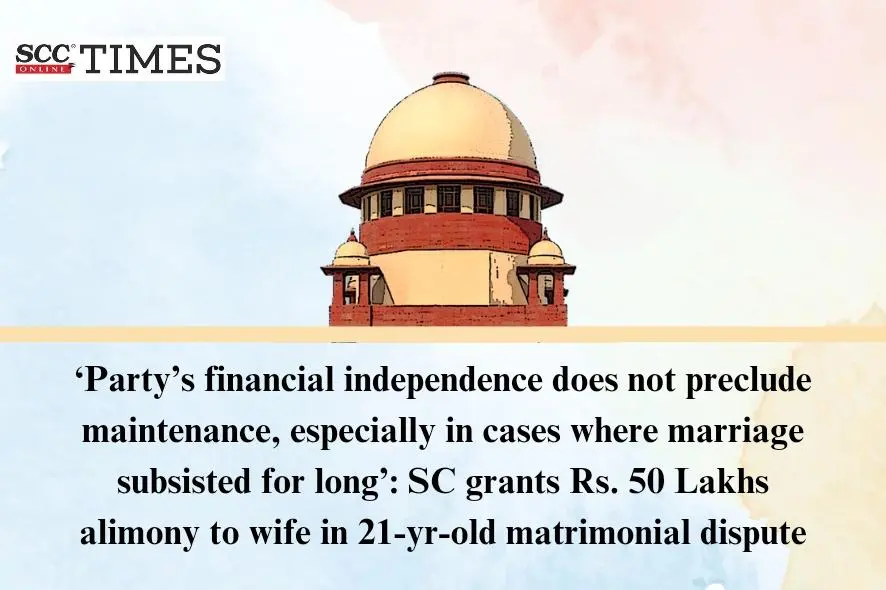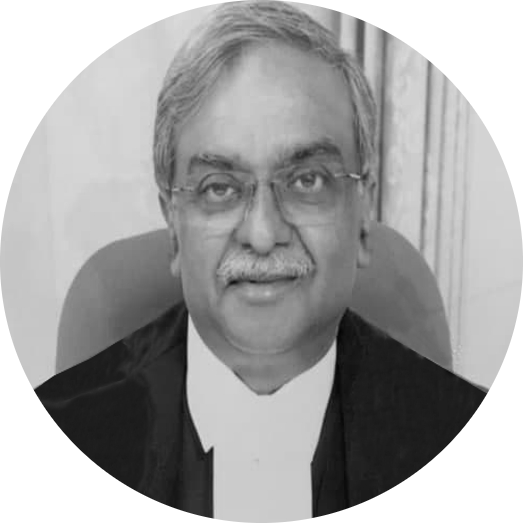Supreme Court: In a civil appeal by the appellant-wife against Madras High Court’s decision, wherein the respondent—husband’s appeal was allowed, and two Judgments of the Trial Courts were set aside, thereby granting a decree of divorce on grounds of cruelty, the Division Bench of Vikram Nath and Prasanna B. Varale, JJ. dismissed the appeal, upholding the decree of divorce, and granted permanent alimony of Rs. 50,00,000/- separately to wife and for the daughter’s future.
Agreeing with the High Court’s decision, the Court reiterated that cruelty, long separation, and irretrievable breakdown of marriage, were established in this case, and thus, provided sufficient justification for dissolving the marriage.
Background
The appellant and the respondent got married on 30-06-2002. Upon giving birth to a female child at her parental home, when the husband requested the wife to return to the matrimonial home, she allegedly refused. Consequently, the husband issued a legal notice for reunion on 29-12-2003, to which the wife replied on 31-12-2003 with allegations against him. Thereafter, the husband filed a petition for restitution of conjugal rights in January 2004, pending which attempts at reconciliation through a panchayat failed. During the pendency of the restitution petition, the wife agreed to resume cohabitation. The couple subsequently moved to Bengaluru, Karnataka, where they resided together. However, the husband alleged that the wife treated him with cruelty during this period. The wife once again left the matrimonial home allegedly without informing the husband and returned to her parental home. The husband claimed that this desertion, combined with the mental anguish caused by her absence during the demise of his father, amounted to cruelty. Consequently, the husband filed a divorce petition in 2010 on the grounds of cruelty.
The Trial Court dismissed the husband’s divorce petition, holding that he failed to establish that wife’s conduct amounted to mental cruelty. His appeal against this decision was also dismissed by the First Appellate Court. The High Court, vide the impugned judgment in its findings, held that lodging false complaints against a spouse amounted to mental cruelty. The High Court noted that the wife had filed a criminal complaint alleging dowry harassment against the husband and his family but later abandoned it without pursuing the matter further and inferred that the complaint was baseless and filed with intent to harass, constituting an act of mental cruelty. Furthermore, the High Court observed that the couple had been living separately for over fifteen years by then, which demonstrated an irretrievable breakdown of the marriage.
Analysis and Decision
Upon careful consideration of the submissions and the established facts, the Court agreed with the High Court’s decision of granting a decree of divorce in favour of the husband. The Court said that the evidence on record unequivocally demonstrated the grounds of cruelty, prolonged separation, and an irretrievable breakdown of the marital relationship. These grounds, coupled with legal precedents Naveen Kohli v. Neelu Kohli, (2006) 4 SCC 558 and Samar Ghosh v. Jaya Ghosh, (2007) 4 SCC 511 cited by the High Court, left no room for doubt that the marriage lost its essence and that its continuation would serve no meaningful purpose
The Court relied on N.G. Dastane (Dr) v. S. Dastane, (1975) 2 SCC 326, reiterating that cruelty is not confined to physical violence but also encompasses actions that inflict mental pain and suffering that creates a reasonable apprehension of harm or injury to the aggrieved spouse from the conduct of the other spouse so as to make it impossible for them to stay together. The Court stated that in the matter at hand, the wife’s conduct, including the initiation of frivolous legal proceedings, fell squarely within the definition of mental cruelty.
The Court also pointed out that wife’s actions were not isolated incidents but formed a pattern of behaviour that made cohabitation impossible and V. Bhagat v. D. Bhagat, (1994) 1 SCC 337 emphasized that sustained and deliberate acts of cruelty make it unreasonable to expect one spouse to continue living with the other. On parties living separately for nearly two decades, the Court observed that, “marriage is a relationship built on mutual trust, companionship, and shared experiences. When these essential elements are missing for an extended period, the marital bond becomes a mere legal formality devoid of any substance.” The Court also added that the length of separation and the evident animosity between the parties clarified that there was no possibility of the marriage being revived.
The Court highlighted that the marriage was broken beyond repair and there was irretrievable breakdown of the marriage as both the parties have been embroiled in legal disputes for years, with no signs of reconciliation. Although irretrievable breakdown of marriage is not a statutory ground for divorce under the HMA, this Court has, in appropriate cases, invoked its powers under Article 142 of the Constitution of India to grant relief where the marriage is beyond repair as in Ashok Hurra v. Rupa Bipin Zaveri, (1997) 4 SCC 226 and Shilpa Sailesh v. Varun Sreenivasan, (2022) 15 SCC 754, it was observed that prolonging a dead marriage serves no interest and only perpetuates the agony of the parties involved.
The Court said that the continuation of the marriage would only lead to further animosity and litigation, causing harm to both parties and that the wife’s insistence on reconciliation was more of a strategy to prolong the proceedings rather than a genuine effort to revive the relationship. The Court observed that forcing a marriage to continue when it has become a source of unhappiness and conflict undermines the very purpose of the institution of marriage.
With regard to compensation, the Court observed that financial independence of a party does not preclude the High Court from granting maintenance if it is necessary to secure dignity, social standing, and financial stability post-divorce, especially in cases where the marriage has subsisted for a long period. Considering that both the parties were software engineers and were earning handsomely at the time of their marriage more than two decades ago, the Court inferred that their respective incomes must have increased substantially over the years. However, considering the dynamics of their separation and the financial burdens the wife may have borne during the protracted litigation, the Court awarded her a permanent alimony of Rs. 50,00,000/- to secure her financial independence and ensure that she can lead her life with dignity. Further, considering that the daughter was of age, the financial support will be instrumental in meeting her educational needs as well as expenses related to her future marriage, hence, Rs. 50,00,000/- was awarded to the daughter for these purposes.
The Court directed that these payments shall be made within four months from the date of this judgment.
CASE DETAILS
|
Citation: Appellants : Respondents : |
Advocates who appeared in this case For Petitioner(s): For Respondent(s): |
CORAM :










For almost 2 decades the husband was subjected to cruelty both by law for delay and his wife, he could have started a new life but now here he have to compensate for the procedural cost of proven fake allegations of wife against him.
What about the dignity of the man. Who will compensate him. This judgement of granting alimony to wife despite imparting proven mental cruelty to husband is pathetic. Its the husband who should be compensated.